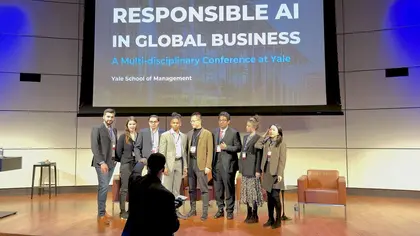The application of empirical methods and new technologies to improve decision-making in the fast-moving and complex situations leaders face today is at the heart of the Yale SOM approach.
The rapid development of artificial intelligence (AI), together with machine learning (ML) and related technologies, continues to reshape our workplaces, accelerate research and innovation, and transform our lives, and the world, at an unprecedented pace. At this critical juncture, Yale SOM—with its deep expertise and distinctive mission—is not only strategically well positioned, but also has an obligation, to advance and disseminate theoretical frameworks and practical applications, which are responsible, ethical, and impactful.

Our curriculum
Students will encounter data analytics and AI applications across the curriculum—from quant-heavy finance courses to entrepreneurship workshops to projects focused on improving the effectiveness of international aid efforts. They will learn rigorous methods to interrogate the performance of initiatives, teams, and organizations, and answer a pivotal question: how can we do better?
Sample courses
Core courses: Probability Modeling & Statistics, Modeling Managerial Decisions, Global Virtual Teams, Innovator, Operations Engine
Electives: Large Language Models: Technology and Applications, Policy Modeling, Generative AI for Managers, Start-up Founder Practicum, Advanced Management of Software Development, Data Analysis and Causal Inference, Big Data & Customer Analytics, Social Media Analytics, Generative AI & Entrepreneurship
Featured course
Community stories

We’re in an exciting moment of seeing generative AI just become massively better. It’s crazy to be a part of shaping the direction of where some of this technology is going to go.
Startup Stories
Students and recent graduates leverage AI to build vibrant businesses.
Resources for Students
The mission of the Artificial Intelligence Association at Yale School of Management is to foster a space for the SOM community to learn about responsible AI applications and be equipped with AI-driven skills for business & society.
The Data Analytics Club seeks to democratize data literacy and promote data-driven decisions for application in both business and society. The group hosts events and provides tutorials and other resources.
The goal of the Technology Club is to educate students about job opportunities available in the tech sector and connect students with alumni, by facilitating one-on-one mentoring, speaker events, job treks, and direct assistance with the internship search.
Faculty research
Professor Paul Goldsmith-Pinkham uses machine learning to study the impact of changing credit models on cross-group disparities in the mortgage market.
Professor Bryan Kelly uses machine learning methods to study financial markets and macroeconomic fluctuations. As part of this research, he develops advanced tools for modeling the information content of textual data and its association with markets and the economy.
Professor Balazs Kovacs uses machine learning and AI methods to study the effect of category-spanning and atypicality. He used deep learning to analyze the text of patents and menus of restaurants and found that patents will receive lower citations if they are assigned to a category to which they are atypical and restaurants receive lower online ratings if their menus are atypical to the cuisine(s) the restaurant claims (e.g., French restaurant selling pizza).
Professor Vineet Kumar uses machine learning to study economic and social value drivers using unstructured data.
Professor Song Ma uses machine learning methods to study the link between human interactions and economic decision-making by analyzing ultra-high dimensional video data. He also studies the evolution of scientific discoveries and technological innovation by analyzing large set of textual information.
Professor Vahideh Manshadi's research partly focuses on the design and operation of online shopping platforms. She uses machine learning methods to study various challenges that such platforms face. For example, click farms—which employ fake consumers to click on certain products in order to trick the platform to overestimate the popularity of those products and thus rank them higher—hurt the consumer’s welfare as well as the platform's profit. In collaboration with researchers from MIT, Harvard, and Google, she aims to find solutions for product ranking on online platforms that are robust to such fraudulent clicks.
Professor K. Sudhir uses and develops machine learning and AI methods for using text and images as new data sources to investigate customer sentiment and emotion based persuasion. He has used online text reviews to study customer sentiment and image and text data in project descriptions on crowdfunding sites to study their persuasive effectiveness.
Professor Kosuke Uetake uses machine learning methods to study the effectiveness of pricing strategies in online credit markets and personalization of goals for members of a weight management application.
Professor Tauhid Zaman uses machine learning methods to study how to shift opinions in social networks. He has built multiple deep neural networks which measure the opinion of content generated in social networks with respect to several polarizing political topics in U.S., UK, and France. He is also using deep reinforcement learning to develop automated social media agents which learn how to interact with users in a social network in order to shift their opinions in a certain direction. These agents learn policies for who to target, what to say, and when to say it.











